Is your latest workshop power supply hill higher than before?
Page 45

If you've noticed an error in this article please click here to report it so we can fix it.
While you're thinking about that, run a check on your compressor and airline system—your money might just he disappearing into thin air.
IT ou may not have
noticed, but since the Climate Change Levy or energy tax came into force on 1 April, your power supply bills will have risen by much as 15%. And, unsurprisingly, ustrial operations such as most tide maintenance facillties and body )air shops don't qualify for any speI considerations, so the extra irges are being collected by the • irgy suppliers and passed on to the asury via the Inland Revenue.
Having recently done its sums the LR (Department for Transport, 3al Government and the Regions) kons that UK industry is paying )und IRO million a year for the elec;ity needed to produce compressed , Amazingly, it says, over a third 100m) is wasted to atmosphere.
This may sound like industry spin, I there's a familiar ring to it. in many rkshops, the sound of money hissfrom the air wrench couplings, wall nnectors or pipework is usually inketed by pop programmes blast, out of the workshop radio.
And, while the tired old compresr chatters away outside, the work as on, sometimes double-shifting, ?,n through the night, but so too do air losses, week-in and week-out, year round.
Even when the accountant agrees reluctantly to fund a new compressor, little attention is paid to the old air distribution network with its flow-resistant junctions, couplings and leaky unions.
In many cases garages could save money just by curing leaks alone. But, if a fleet workshop is to remain profitable, much more serious efforts are needed to reduce energy consumption.
Air demand audit
"One way to keep costs down is to have your workshop's energy consumption audited," says Motivair Compressor's sales director Howard Dry-Parker. "Review the entire compressed air system, and check out the maintenance too."
Motivair Compressors, one of Europe's larger independent distributors of air compressors and associated equipment, provides a real-time auditing service that will calculate precisely a workshop's air demand.
"Having a compressor running when air isn't needed wastes energy," he says. "An audit will quickly identify whether you're using the right type and capacity of compressor, and the suitability of the control equipment and air filtration."
Filter elements have an optimum life and once they're neglected you start using up more energy to push the air through. A compressor shouldn't have to work harder just to overcome an inadequate filter. Technological improvements continue to push up the cost of power toots and paint application equipment, so air quality is another critical factor in the compressed air plant selection process.
An audit would automatically con
sider such advances, according to Dry-Parker. From the data collected it would determine the best combination of compressor plant and control equipment from various manufacturers before making its recommendations. Companies can make considerable bottom line savings from such an




















































































































